Overview
- Description
- The Segen family papers consist of biographical materials, resettlement and immigration papers, restitution papers, correspondence, and photographs documenting the experiences of Berta and Moses Segen in the Borszczów and Radom, Poland ghettos; their time in resettlement camps in Germany; and their immigration to the United States in 1949. The papers include birth certificates, immigration applications, restitution testimonies, correspondence, and family photographs.
The biographical material includes birth certificates, an extensive Silberbusch family tree in Hebrew, and business papers related to the dissolution of a business Moses co-owned. The resettlement and immigration papers include travel arrangements from the displaced person camp in Stuttgart to the United States, immigration applications, and naturalization certificates. The restitution papers include testimonies from Berta and Moses and bank statements. The correspondence includes letters to Berta from her sister Hela in Israel, a letter from Moses requesting a visitor’s visa for Hela to visit the United States from Israel to be present for Leon’s Bar Mitzvah, and copies of two emails exchanged between Leon and Hela’s son Moshe about their parents’ respective decisions to emigrate to the United States and Israel. The photographs primarily consist of baby and childhood photographs of Leon as well as photographs of Berta and Moses while in Stuttgart and their passport pictures. Also included are three photographs of Moses’s family. One picture is likely of soldiers in uniform from circa 1916, and the two others are of his family in Radom, Poland, 1933. The printed material includes a German photograph book and Hebrew/English calendar and reference book. - Date
-
inclusive:
1911-2003
bulk: 1948-1981
- Credit Line
- United States Holocaust Memorial Museum Collection, Gift of the Estate of Leon Segen
- Collection Creator
- Segen family
- Biography
-
Berta Segen (1911-2004) was born in Borszczów, Poland (now Borshchiv, Ukraine) to Moses and Sabina Silberbusch. Her sister’s written testimony and birth certificate indicate she was born in 1911, but several other documents place birth in 1920 or 1922. Berta often also went by the name Betka.
Moses Segen (1904-1996) was born Moszek Chaim Zegien in Radom, Poland to Lejba and Bina Zegien. His birth certificate indicates he was born in 1904, but his certificate of naturalization places his birth in 1914. His father worked as a merchant, and Moses worked as a shoemaker in Poland before the war.
Moses and Berta married on June 30, 1939 in Borszczów, Poland. After Poland was invaded in September 1939, Moses was separated from Berta. He was in the Radom ghetto from April 1941 to August 1942. From August 1942 to August 1943 he was in a forced labor camp in Radom. His relative, Jacob Krantz, was also in the Radom camps. There is little information on his years from August 1943 to summer 1945. His entire family in Radom was killed.
Berta and her mother were sent to the Borszczów ghetto in September, 1941. In the summer of 1943, Berta and her cousin Frieda Steiner escaped the camp. Berta hid on a farm in Turylcze, Poland until May, 1945. Moses and Berta were reunited in the displaced persons camp in Waldenburg, Germany in the summer of 1945. They remained in the camp until spring 1946 when they were relocated to the I.R.O. Resettlement Camp, Ludwigsburg, Germany near Stuttgart. Their son, Leon, was born in the camp in 1948. In 1949, with sponsorship from Moses’s cousin Jacob Krantz, the Segens emigrated from Germany to the United States on the SS General Taylor. They settled in the Bronx, New York where Moses worked as a merchant and co-owned Senac Drygoods Store in the early 1950s.
Leon Segen (1948-2014) grew up in the Bronx, New York. He attended City College and then taught high school during the Vietnam War. He returned to school at New York University and State University of New York at Stony Brook, and graduated from Yeshiva University in 1980 with a law degree. He resided in Riverdale, New York and was involved in Second Generation Holocaust Survivor organizations as well as the legal profession.
Physical Details
- Genre/Form
- Photographs.
- Extent
-
1 box
- System of Arrangement
- The Segen family papers are arranged as six series: Series 1: Biographical material, 1911-1999; Series 2: Resettlement and immigration papers, 1949-1958; Series 3: Restitution papers, 1950-1981; Series 4: Correspondence, 1947-2003; Series 5: Photographs, circa 1916-circa 1981; Series 6: Printed material, circa 1930s-1950. All series are arranged alphabetically by subject.
Rights & Restrictions
- Conditions on Access
- There are no known restrictions on access to this material.
- Conditions on Use
- Material(s) in this collection may be protected by copyright and/or related rights. You do not require further permission from the Museum to use this material. The user is solely responsible for making a determination as to if and how the material may be used.
Keywords & Subjects
- Topical Term
- Jewish ghettos--Poland--Radom (Radom) Displaced persons camps. United States--Emigration and immigration--History--20th century. Holocaust survivors--Poland. Holocaust, Jewish (1939-1945)--Reparations.
- Geographic Name
- Radom (Poland) Borshchiv (Ternopil’s’ka oblast’, Ukraine)
- Personal Name
- Segen, Berta. Segen, Moses.
Administrative Notes
- Holder of Originals
-
United States Holocaust Memorial Museum
- Legal Status
- Permanent Collection
- Provenance
- The Estate of Leon Segen donated the Segen family papers to the United States Holocaust Memorial Museum in 2015.
- Record last modified:
- 2024-03-08 07:30:37
- This page:
- https://collections.ushmm.org/search/catalog/irn608022
Additional Resources
Download & Licensing
- In Copyright - Use Permitted
- Terms of Use
- This record is not digitized and cannot be downloaded online.
In-Person Research
- Request 7 Days in Advance of Visit
- Plan a Research Visit
-
Request in Shapell Center Reading Room
Bowie, MD
Contact Us
Also in Segen family collection
The Segen family collection consist of biographical materials, resettlement and immigration papers, restitution papers, correspondence, photographs, childrens clothing and artifacts documenting the experiences of Berta and Moses Segen in the Borszczów and Radom, Poland ghettos; their time in resettlement camps in Germany; and their immigration to the United States in 1949.
Date: 1911-2003
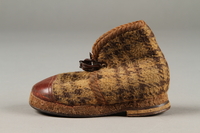
Pair of children's boots
Object
Pair of children's ankle boots. Fabric upper with brown and tan checkered pattern. Metal fastener holds each shoe onto foot. Leather trim on toe. The boots are part of a collection illustrating the experiences of Moses Segen (b. 1914 in Radom, Poland) and Berta (nee Silberbusch, b. 1920 in Borczow, Poland) and their son Leon who was born in 1948 in Stuttgart, Germany. Family lived in Ludwigsburg resettlement camp near Stuttgart. Moses was interned in the Radom Ghetto from 1941 to 1943 at which time he fled. Berta, or Betka was interned in the Borczow Ghetto from 1941-1943 at which time she fled. They were both separately liberated in May 1945, moved to displaced persons camp, married and gave birth to Leon, then immigrated to the United States.
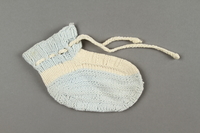
Pair of baby booties
Object
Pair of blue and white knit baby booties.The booties are part of a collection illustrating the experiences of Moses Segen (b. 1914 in Radom, Poland) and Berta (nee Silberbusch, b. 1920 in Borczow, Poland) and their son Leon who was born in 1948 in Stuttgart, Germany. Family lived in Ludwigsburg resettlement camp near Stuttgart. Moses was interned in the Radom Ghetto from 1941 to 1943 at which time he fled. Berta, or Betka was interned in the Borczow Ghetto from 1941-1943 at which time she fled. They were both separately liberated in May 1945, moved to displaced persons camp, married and gave birth to Leon, then immigrated to the United States.
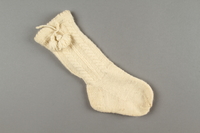
Pair of children's socks
Object
Pair of cream colored knit wool socks with tassels. The socks are part of a collection illustrating the experiences of Moses Segen (b. 1914 in Radom, Poland) and Berta (nee Silberbusch, b. 1920 in Borczow, Poland) and their son Leon who was born in 1948 in Stuttgart, Germany. Family lived in Ludwigsburg resettlement camp near Stuttgart. Moses was interned in the Radom Ghetto from 1941 to 1943 at which time he fled. Berta, or Betka was interned in the Borczow Ghetto from 1941-1943 at which time she fled. They were both separately liberated in May 1945, moved to displaced persons camp, married and gave birth to Leon, then immigrated to the United States.
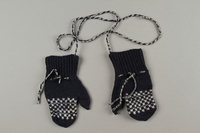
Pair of children's mittens
Object
Pair of navy and white knit wool mittens with string keeping the mittens together. The mittens are part of a collection illustrating the experiences of Moses Segen (b. 1914 in Radom, Poland) and Berta (nee Silberbusch, b. 1920 in Borczow, Poland) and their son Leon who was born in 1948 in Stuttgart, Germany. Family lived in Ludwigsburg resettlement camp near Stuttgart. Moses was interned in the Radom Ghetto from 1941 to 1943 at which time he fled. Berta, or Betka was interned in the Borczow Ghetto from 1941-1943 at which time she fled. They were both separately liberated in May 1945, moved to displaced persons camp, married and gave birth to Leon, then immigrated to the United States.
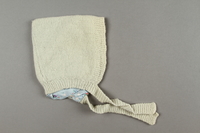
Baby bonnet
Object
Light green wool baby bonnet with blue floral patterned lining. The bonnet is part of a collection illustrating the experiences of Moses Segen (b. 1914 in Radom, Poland) and Berta (nee Silberbusch, b. 1920 in Borczow, Poland) and their son Leon who was born in 1948 in Stuttgart, Germany. Family lived in Ludwigsburg resettlement camp near Stuttgart. Moses was interned in the Radom Ghetto from 1941 to 1943 at which time he fled. Berta, or Betka was interned in the Borczow Ghetto from 1941-1943 at which time she fled. They were both separately liberated in May 1945, moved to displaced persons camp, married and gave birth to Leon, then immigrated to the United States.
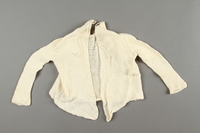
Baby sweater
Object
Cream colored knit baby sweater.The sweater is part of a collection illustrating the experiences of Moses Segen (b. 1914 in Radom, Poland) and Berta (nee Silberbusch, b. 1920 in Borczow, Poland) and their son Leon who was born in 1948 in Stuttgart, Germany. Family lived in Ludwigsburg resettlement camp near Stuttgart. Moses was interned in the Radom Ghetto from 1941 to 1943 at which time he fled. Berta, or Betka was interned in the Borczow Ghetto from 1941-1943 at which time she fled. They were both separately liberated in May 1945, moved to displaced persons camp, married and gave birth to Leon, then immigrated to the United States.
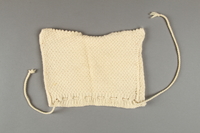
Child's wool hat
Object
Cream colored wool hat. The hat is part of a collection illustrating the experiences of Moses Segen (b. 1914 in Radom, Poland) and Berta (nee Silberbusch, b. 1920 in Borczow, Poland) and their son Leon who was born in 1948 in Stuttgart, Germany. Family lived in Ludwigsburg resettlement camp near Stuttgart. Moses was interned in the Radom Ghetto from 1941 to 1943 at which time he fled. Berta, or Betka was interned in the Borczow Ghetto from 1941-1943 at which time she fled. They were both separately liberated in May 1945, moved to displaced persons camp, married and gave birth to Leon, then immigrated to the United States.
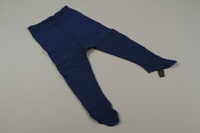
Child's wool pants
Object
Navy knit wool pants orl tights with elastic around waist and elastic stirrups. The pants are part of a collection illustrating the experiences of Moses Segen (b. 1914 in Radom, Poland) and Berta (nee Silberbusch, b. 1920 in Borczow, Poland) and their son Leon who was born in 1948 in Stuttgart, Germany. Family lived in Ludwigsburg resettlement camp near Stuttgart. Moses was interned in the Radom Ghetto from 1941 to 1943 at which time he fled. Berta, or Betka was interned in the Borczow Ghetto from 1941-1943 at which time she fled. They were both separately liberated in May 1945, moved to displaced persons camp, married and gave birth to Leon, then immigrated to the United States.
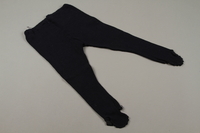
Child's wool pants
Object
Navy knit wool pants orl tights with elastic around waist and elastic stirrups. The pants are part of a collection illustrating the experiences of Moses Segen (b. 1914 in Radom, Poland) and Berta (nee Silberbusch, b. 1920 in Borczow, Poland) and their son Leon who was born in 1948 in Stuttgart, Germany. Family lived in Ludwigsburg resettlement camp near Stuttgart. Moses was interned in the Radom Ghetto from 1941 to 1943 at which time he fled. Berta, or Betka was interned in the Borczow Ghetto from 1941-1943 at which time she fled. They were both separately liberated in May 1945, moved to displaced persons camp, married and gave birth to Leon, then immigrated to the United States.
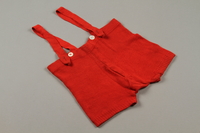
Child's short pants with suspenders
Object
Red knit shorts with suspenders. The pants are part of a collection illustrating the experiences of Moses Segen (b. 1914 in Radom, Poland) and Berta (nee Silberbusch, b. 1920 in Borczow, Poland) and their son Leon who was born in 1948 in Stuttgart, Germany. Family lived in Ludwigsburg resettlement camp near Stuttgart. Moses was interned in the Radom Ghetto from 1941 to 1943 at which time he fled. Berta, or Betka was interned in the Borczow Ghetto from 1941-1943 at which time she fled. They were both separately liberated in May 1945, moved to displaced persons camp, married and gave birth to Leon, then immigrated to the United States.
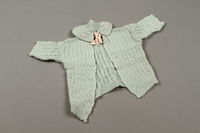
Baby sweater
Object
Blue wool knit sweater with pink tie at the neck and flower detail on the collar. The sweater is part of a collection illustrating the experiences of Moses Segen (b. 1914 in Radom, Poland) and Berta (nee Silberbusch, b. 1920 in Borczow, Poland) and their son Leon who was born in 1948 in Stuttgart, Germany. Family lived in Ludwigsburg resettlement camp near Stuttgart. Moses was interned in the Radom Ghetto from 1941 to 1943 at which time he fled. Berta, or Betka was interned in the Borczow Ghetto from 1941-1943 at which time she fled. They were both separately liberated in May 1945, moved to displaced persons camp, married and gave birth to Leon, then immigrated to the United States.
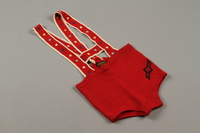
Knit baby shorts with suspenders
Object
Red knit shorts with suspenders. A label reading "Benger-Ribana" is sewn onto the back of the shorts, and there is a patch with the letter "R" sewn onto the front of the shorts. The built-in suspenders are decorated with multicolored embroidered polka dots. The shorts are part of a collection illustrating the experiences of Moses Segen (b. 1914 in Radom, Poland) and Berta (nee Silberbusch, b. 1920 in Borczow, Poland) and their son Leon who was born in 1948 in Stuttgart, Germany. Family lived in Ludwigsburg resettlement camp near Stuttgart. Moses was interned in the Radom Ghetto from 1941 to 1943 at which time he fled. Berta, or Betka was interned in the Borczow Ghetto from 1941-1943 at which time she fled. They were both separately liberated in May 1945, moved to displaced persons camp, married and gave birth to Leon, then immigrated to the United States.
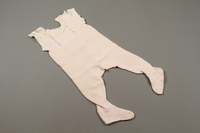
Knit romper
Object
Light pink knit footed romper. Sleeveless, with embroidery and white plastic buttons.The romper is part of a collection illustrating the experiences of Moses Segen (b. 1914 in Radom, Poland) and Berta (nee Silberbusch, b. 1920 in Borczow, Poland) and their son Leon who was born in 1948 in Stuttgart, Germany. Family lived in Ludwigsburg resettlement camp near Stuttgart. Moses was interned in the Radom Ghetto from 1941 to 1943 at which time he fled. Berta, or Betka was interned in the Borczow Ghetto from 1941-1943 at which time she fled. They were both separately liberated in May 1945, moved to displaced persons camp, married and gave birth to Leon, then immigrated to the United States.
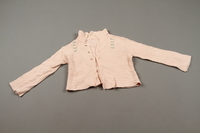
Child's sweater
Object
Light pink knit cardigan sweater with floral embroidery.The sweater is part of a collection illustrating the experiences of Moses Segen (b. 1914 in Radom, Poland) and Berta (nee Silberbusch, b. 1920 in Borczow, Poland) and their son Leon who was born in 1948 in Stuttgart, Germany. Family lived in Ludwigsburg resettlement camp near Stuttgart. Moses was interned in the Radom Ghetto from 1941 to 1943 at which time he fled. Berta, or Betka was interned in the Borczow Ghetto from 1941-1943 at which time she fled. They were both separately liberated in May 1945, moved to displaced persons camp, married and gave birth to Leon, then immigrated to the United States.
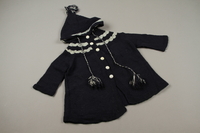
Child's hooded sweater coat
Object
Child's navy knit hooded sweater or coat. Buttoned with tassles. Light gray knit details on the tassles and along neckline and hood. The sweater is part of a collection illustrating the experiences of Moses Segen (b. 1914 in Radom, Poland) and Berta (nee Silberbusch, b. 1920 in Borczow, Poland) and their son Leon who was born in 1948 in Stuttgart, Germany. Family lived in Ludwigsburg resettlement camp near Stuttgart. Moses was interned in the Radom Ghetto from 1941 to 1943 at which time he fled. Berta, or Betka was interned in the Borczow Ghetto from 1941-1943 at which time she fled. They were both separately liberated in May 1945, moved to displaced persons camp, married and gave birth to Leon, then immigrated to the United States.
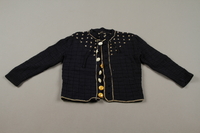
Child's sweater
Object
Child's navy knit cardigan sweater with light gray trim and polka dots along the neckline. The sweater has a mixture of yellow and white buttons. The sweater is part of a collection illustrating the experiences of Moses Segen (b. 1914 in Radom, Poland) and Berta (nee Silberbusch, b. 1920 in Borczow, Poland) and their son Leon who was born in 1948 in Stuttgart, Germany. Family lived in Ludwigsburg resettlement camp near Stuttgart. Moses was interned in the Radom Ghetto from 1941 to 1943 at which time he fled. Berta, or Betka was interned in the Borczow Ghetto from 1941-1943 at which time she fled. They were both separately liberated in May 1945, moved to displaced persons camp, married and gave birth to Leon, then immigrated to the United States.
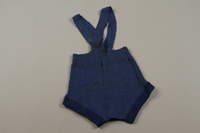
Child's knit shortalls
Object
Navy knit shortalls. The clothing is part of a collection illustrating the experiences of Moses Segen (b. 1914 in Radom, Poland) and Berta (nee Silberbusch, b. 1920 in Borczow, Poland) and their son Leon who was born in 1948 in Stuttgart, Germany. Family lived in Ludwigsburg resettlement camp near Stuttgart. Moses was interned in the Radom Ghetto from 1941 to 1943 at which time he fled. Berta, or Betka was interned in the Borczow Ghetto from 1941-1943 at which time she fled. They were both separately liberated in May 1945, moved to displaced persons camp, married and gave birth to Leon, then immigrated to the United States.
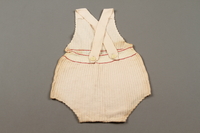
Child's romper
Object
Light pink knit romper with suspenders.The clothing is part of a collection illustrating the experiences of Moses Segen (b. 1914 in Radom, Poland) and Berta (nee Silberbusch, b. 1920 in Borczow, Poland) and their son Leon who was born in 1948 in Stuttgart, Germany. Family lived in Ludwigsburg resettlement camp near Stuttgart. Moses was interned in the Radom Ghetto from 1941 to 1943 at which time he fled. Berta, or Betka was interned in the Borczow Ghetto from 1941-1943 at which time she fled. They were both separately liberated in May 1945, moved to displaced persons camp, married and gave birth to Leon, then immigrated to the United States.
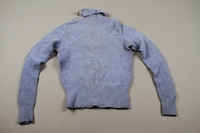
Blue turtleneck sweater
Object
Blue turtleneck sweater with zipper in back. Large child's size or small adult size.The clothing is part of a collection illustrating the experiences of Moses Segen (b. 1914 in Radom, Poland) and Berta (nee Silberbusch, b. 1920 in Borczow, Poland) and their son Leon who was born in 1948 in Stuttgart, Germany. Family lived in Ludwigsburg resettlement camp near Stuttgart. Moses was interned in the Radom Ghetto from 1941 to 1943 at which time he fled. Berta, or Betka was interned in the Borczow Ghetto from 1941-1943 at which time she fled. They were both separately liberated in May 1945, moved to displaced persons camp, married and gave birth to Leon, then immigrated to the United States.
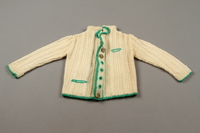
Child's lederhosen and cardigan sweater set
Object
Cream colored knit cardigan sweater (a) and lederhosen (b) set with green yarn trim and plastic buttons. The clothing is part of a collection illustrating the experiences of Moses Segen (b. 1914 in Radom, Poland) and Berta (nee Silberbusch, b. 1920 in Borczow, Poland) and their son Leon who was born in 1948 in Stuttgart, Germany. Family lived in Ludwigsburg resettlement camp near Stuttgart. Moses was interned in the Radom Ghetto from 1941 to 1943 at which time he fled. Berta, or Betka was interned in the Borczow Ghetto from 1941-1943 at which time she fled. They were both separately liberated in May 1945, moved to displaced persons camp, married and gave birth to Leon, then immigrated to the United States.
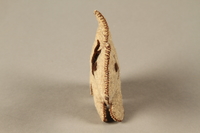
Toy dog made of wool
Object
Toy scottie dog made of wool with a felt scarf. The toy is part of a collection illustrating the experiences of Moses Segen (b. 1914 in Radom, Poland) and Berta (nee Silberbusch, b. 1920 in Borczow, Poland) and their son Leon who was born in 1948 in Stuttgart, Germany. Family lived in Ludwigsburg resettlement camp near Stuttgart. Moses was interned in the Radom Ghetto from 1941 to 1943 at which time he fled. Berta, or Betka was interned in the Borczow Ghetto from 1941-1943 at which time she fled. They were both separately liberated in May 1945, moved to displaced persons camp, married and gave birth to Leon, then immigrated to the United States.
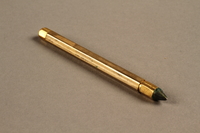
Brass pen and pencil set with case
Object
Small set comprising a brass pen and pencil inside a case. The set is part of a collection illustrating the experiences of Moses Segen (b. 1914 in Radom, Poland) and Berta (nee Silberbusch, b. 1920 in Borczow, Poland) and their son Leon who was born in 1948 in Stuttgart, Germany. Family lived in Ludwigsburg resettlement camp near Stuttgart. Moses was interned in the Radom Ghetto from 1941 to 1943 at which time he fled. Berta, or Betka was interned in the Borczow Ghetto from 1941-1943 at which time she fled. They were both separately liberated in May 1945, moved to displaced persons camp, married and gave birth to Leon, then immigrated to the United States.
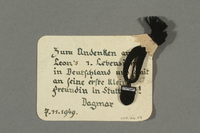
Handcrafted card with souvenir pendant attached
Object
Handcrafted card with color drawing of a bee on a flower. The verso is inscribed with a handwritten note in German from "Dagmar" and is dated 7.11.1949. The verso has a slot to which is attached a shield-shaped souvenir pendant or charm from Stuttgart hanging from a loop of black thread. The card with souvenir pendant is part of a collection illustrating the experiences of Moses Segen (b. 1914 in Radom, Poland) and Berta (nee Silberbusch, b. 1920 in Borczow, Poland) and their son Leon who was born in 1948 in Stuttgart, Germany. Family lived in Ludwigsburg resettlement camp near Stuttgart. Moses was interned in the Radom Ghetto from 1941 to 1943 at which time he fled. Berta, or Betka was interned in the Borczow Ghetto from 1941-1943 at which time she fled. They were both separately liberated in May 1945, moved to displaced persons camp, married and gave birth to Leon, then immigrated to the United States.



